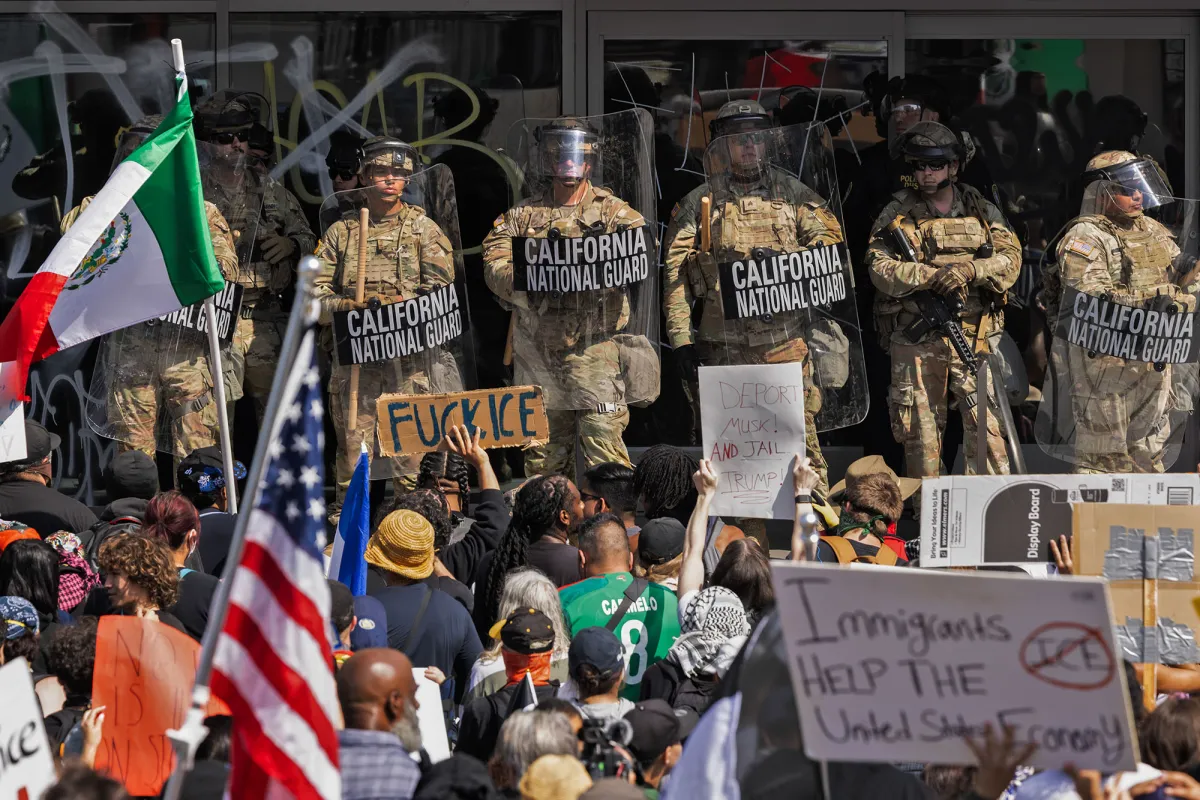Trump Lawyers Claim Court Cannot Review His Decision to Send Troops to LA
Introduction: A Legal and Political Earthquake in California
A major constitutional clash is unfolding between former President Donald Trump and California’s state leadership over the controversial deployment of National Guard troops to Los Angeles. At the heart of the dispute is a bold legal argument from Trump’s attorneys—that his decision to send federal troops into a U.S. city is “unreviewable” by American courts.
With the 9th Circuit Court of Appeals now deliberating on the case, the outcome could set a precedent with deep implications for civil liberties, state sovereignty, and the boundaries of presidential power.
Background: Military on the Streets of LA
In early June 2025, President Trump ordered the National Guard and U.S. Marines into Los Angeles in response to growing protests over immigration enforcement and recent ICE raids. Thousands of demonstrators poured into downtown LA, demanding an end to what they viewed as unconstitutional federal overreach.
The move was met with immediate backlash from California leaders, particularly Governor Gavin Newsom, who argued that local authorities had the situation under control and federal troops were not only unnecessary but provocative.
Mayor Karen Bass imposed a curfew to contain unrest, but tensions soared as heavily armed personnel appeared across public spaces, escalating public concern and legal action.
The Legal Challenge: Is the President Above Review?
The Trump administration’s legal defense, presented by Justice Department attorney Brett Shumate, hinges on a rarely used federal law dating back to the early 1900s. This statute allows the president to federalize state National Guard troops under specific conditions—namely, rebellion, invasion, or the inability to enforce federal law with regular forces.
But the administration took the argument a step further. Even if the president misused or misunderstood the law, his decision, they say, is not subject to judicial review.
“If the statute is unreviewable, it’s unreviewable,” Shumate told the panel of judges. “There’s no role for the court to play.”
That sweeping claim—that courts cannot challenge the president’s use of military force domestically—left many legal experts stunned.
Pushback from the State and National Security Experts
California’s legal team described Trump’s position as “terrifying”, warning that it would essentially give the president unchecked authority to send troops anywhere in the country, for any reason—or even for no reason at all.
Joseph Nunn, a national security attorney, called the argument “astonishing,” and emphasized the risk it poses to American democracy.
“This is fundamentally not how we do things in the United States,” said Nunn.
Supporting Newsom’s case, a coalition of eight former secretaries of the Army and Navy and multiple retired four-star generals warned that using troops for domestic law enforcement without clear justification undermines public trust and military morale.
What the Courts Are Considering
The three-judge panel of the 9th Circuit showed signs of grappling with the magnitude of the issue. One judge asked whether the courts have any authority to review the president’s actions if they were carried out under the disputed statute—particularly if no evidence or reasoning was offered for the decision.
So far, the Trump administration has not provided detailed justifications, only insisting that the protests represented a threat severe enough to warrant the deployment.
Yet, according to filings from Newsom’s lawyers, the original crowd that triggered the deployment dispersed within hours of the LAPD’s arrival. Local police, county sheriffs, and other agencies had already arrested hundreds, and the city had not requested federal assistance.
The Statute at the Center of It All
The law in question dates back to 1908 and includes language stating that federalization orders “shall be issued through the governors.” The ambiguity of the word “through” has led to intense legal wrangling over whether gubernatorial approval is required or merely procedural.
Governor Newsom’s team argues that the president violated both the letter and the spirit of the law by unilaterally sending in troops, particularly since only one previous president—Richard Nixon during a 1970 postal strike—used the law in a similar fashion.
Is There a Rebellion in the Streets of Los Angeles?
The Trump administration insists the situation in Los Angeles meets the threshold of a “rebellion.” According to Shumate, the presence of a thousand “violent protesters” necessitated the Guard’s deployment.
However, this claim is disputed by local reports and even footage from the scene. Journalists and legal observers noted that protests were largely peaceful until federal forces attempted to disperse crowds using tear gas, mounted officers, and less-lethal weapons.
Protesters carried banners reading “No Kings”, accusing the former president of authoritarianism. The standoff quickly became a flashpoint in the broader national debate over the limits of federal power and civilian-military relations.
What’s Next: A Road to the Supreme Court?
The immediate question before the court is whether Trump can retain control of the National Guard while the broader legal battle unfolds. A ruling is expected soon from the 9th Circuit, but any decision is likely to be appealed—possibly all the way to the U.S. Supreme Court.
Meanwhile, a separate hearing in district court will determine whether to place a preliminary injunction on Trump’s order, which would halt the deployment during the full trial. For California to succeed, it must show that its legal challenge is likely to prevail at trial and that the harm being done is both immediate and irreversible.
High Stakes for the Nation
The broader implications of this case are profound. If Trump’s interpretation is upheld, it could embolden future presidents to use military force in domestic disputes without oversight, blurring the line between civilian governance and military control.
Governor Newsom’s legal team warned that this would erode the foundational principle of separating military and civilian spheres—a cornerstone of American democracy.
As public protests continue and legal arguments escalate, the nation watches closely. The battle over Los Angeles is no longer just about one city—it’s about who holds the power in a democracy, and how far that power can go.

COMMENTS (0)
Sign in to join the conversation
LOGIN TO COMMENT